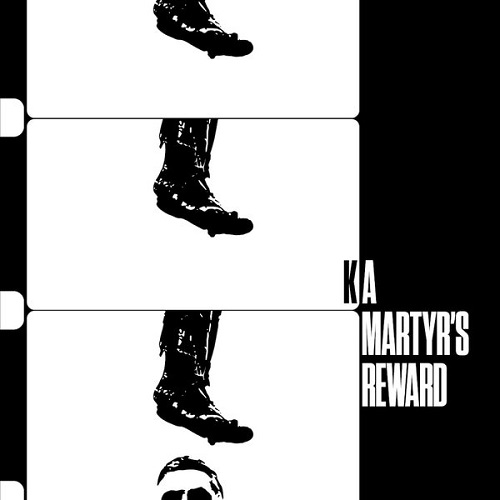Looking at the year-end album lists in 2021, judging by the strong presence of people such as the Griselda crew, their pal Mach-Hommy, MIKE, Wiki, Moor Mother, Armand Hammer, and a few others, it looks like the center of gravity of rap music is back to the East Coast. At least from a critics' point of view. Those are returning to their first loves. Once again, they have a crush on this good old bold and arty boom bap they used to celebrate twenty years ago, already.

And if one guy among these deserves such praises, now that he reaches his fifties, Ka is that one. Each of the concept-albums he released over the last ten years, with their Japanese, Ancient Greece, or biblical themes, was better than the last.
A Martyr's Reward is no exception. That one, however, doesn't need any mythological paraphernalia. This time, Ka approaches frontally the subject matters that, at the end of the day, were always his: his life, his surrounding, and the perpetual damnation of the African American community.
This is some conscious rap again.
On "Sad To Say", Ka talks about his dog's life, and about those – the exploiters of rap music? Its fans? - who love to hear about it. On "Enough Praise / Recovering", he says his existence was a long convalescence. On "Everybody Up", he urges people to make it through, and to overcome the cycle of violence. On "I Need All That", he claims back the many things that were stolen to the Black people: their styles, their culture, their music, their dances, their souls, their lands...
Ka, in the meanwhile, takes a few blows. He endures them. On "Like Me", he boasts about his resilience. On "With All My Heart", he signals to those who criticized him because of borderline lyrics, that as a fireman, he was among those who saved them when the Twin Towers fell on 9/11. On "Having Nothin'", he states that poverty gave him a purpose – "having nothing gave me everything", he keeps on saying. And on "I Notice", the central song on the album, using lyrics from the greatest, Nina Simone, Ka talks about his mission in that tough world. Which is: preaching, testifying, even if it means sacrificing his happiness. In short, being a martyr.
Ka is someone who speaks. His words weight a ton. His dense lyrics need to be heard and analyzed carefully. The are full of hidden meanings and double-entendres, while the music gets reduced to the strict minimum. The rhythm, that is supposedly the core component of hip-hop music, almost disappears. It is replaced by a piano loop on "I Need All That", some depressed brass instrument on "Subtle", or an ethereal atmosphere, barely troubled on "Peace Peace Peace" by the voice of a guest, Joi from the Dungeon Family.
Instead of the familiar pulsation, we have the arpeggios of many guitars, some erratic, like on "Everybody Up", and others supported by a synthesizer, like with the second part of "We Livin’ / Martyr", or an organ, on "PWH". There are others, stormy and electric, like on "Like Me". And when drums finally emerge, on "Be Grateful", another guitar song, this is to add some thunder to the music, and not rhythm.
The production is essentially delivered by Ka himself. He does it alone, to strengthen the intimate aspect of the album. And when he seeks the assistance of others, his goal is not to enlarge or diversify his panel. Quite the opposite: he solicits like-minded people. Some are old-timers from his generation, such as Preservation, and others are younger, like Navy Blue, who features on "We Livin’ / Martyr".
That peculiar track shines a light on the album title. There, it is specified that the martyr's reward is the definitive end of all sufferings. It is death. Ka, actually, is the martyr. He sacrifices himself, so that he can save his people. This is all dark and gloomy. And though, we are glad to be part of his cult.
